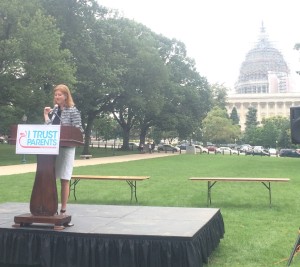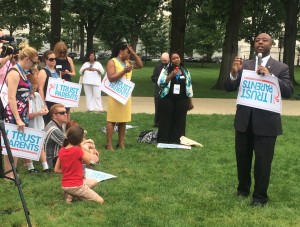
NEWSWIRE: July 21, 2015
Vol. 17, No. 29
STUDENT RIGHTS, ROUND 2. A second lawsuit in defense of student rights is underway in California, this time under the name Jane Doe, et al. v. Antioch Unified School District, et al. Just as the Vergara v. California suit sought to uphold the constitutional rights of students by reversing unproductive teacher employment practices, the Doe v. Antioch case challenges 13 districts in violation of a state law called the Stull Act that requires teacher evaluations to consider student progress. In 2012, the Los Angeles Unified School District was found in violation of the Stull Act, but three years later, the board and teachers union have yet to agree on how to implement the ruling enforcing the inclusion of student performance in teacher evaluations. As the Los Angeles Times Editorial Board notes, “lawsuits aren’t the best way to improve schools,” but when a Legislature is too controlled by the teachers union and thus repeatedly fails to make changes that would benefit students, “sometimes they’re the only way.”
SOLUTION: CHARTERS. With an already strained and ill-prepared workforce, it’s imperative for the U.S economy that we tackle mediocrity and quickly grow education options to meet the needs of our students. Charter schools can, and should be, part of that solution. Growing at a steady, linear pace over the years, charter school growth could be accelerated to allow charters to play a more central role in U.S. education. Take St. Johns County, Florida, for example, where a school board member calls for a tax increase in order for the district to meet an anticipated 47 percent increase of students expected in the next 10 years. The U.S. already spends more than any industrialized nation on education, and with a less than stellar return on investment with less than 40 percent of students able to read and compute at grade level. Combine this with the fact that the bureaucracy of our traditional education system is not synonymous with speedy, and it’s clear that in order to address the urgency at which our children need excellent schools, we must look at innovative, accountable options like charter schools.
TRUST PARENTS. It was hot out this morning in Washington, D.C., but that didn’t stop school choice advocates, parents, educators, and families from coming together to celebrate school choice at the #ITrustParents rally on the Hill. “Despite the widespread acceptance and rapid growth of school choice, millions of families still do not have the freedom to choose the best education for their child,” The Center for Education Reform (CER) President Kara Kerwin told the audience, stressing the need for more and better education options. The D.C. School Reform Act and the Opportunity Scholarship program brought major changes to D.C. education, Kerwin recalled, offering parents for the first time the freedom and opportunity to choose a better future for their child. Echoing those sentiments, Senator Tim Scott (R-SC) noted that with D.C. vouchers, “for 40 cents on the dollar, you can nearly double the graduation rate.” Choices are creating a ripple effect and improving outcomes for students across America, but just five percent of school-aged students are taking advantage of charter schools or school choice programs. As we approach 2016 elections, we must continue to call on elected officials to stop playing politics and do what’s right: trust parents, because “money, zip codes, and political will should no longer dictate our fundamental right as parents to choose what is best for our own children.” Take action now and encourage others to let elected officials know they should trust parents by texting ITRUSTPARENTS to 52886 or clicking here.
ICYMI: EVERY CHILD ACHIEVES. In a 87-17 vote, the U.S. Senate passed the Every Child Achieves act last Thursday. Meant to reauthorize the Elementary and Secondary Education Act (ESEA), more recently known as the No Child Left Behind Act, CER is encouraged by the legislation for reinforcing the principle of local autonomy and state sovereignty, and believes that “along with a strong House bill, will correct the overreach of this and subsequent administrations for years to come.” The House passed its ESEA replacement, called the Student Success Act, eight days before the Senate passed its version, and now both bills will go to conference committee for reconciliation.













